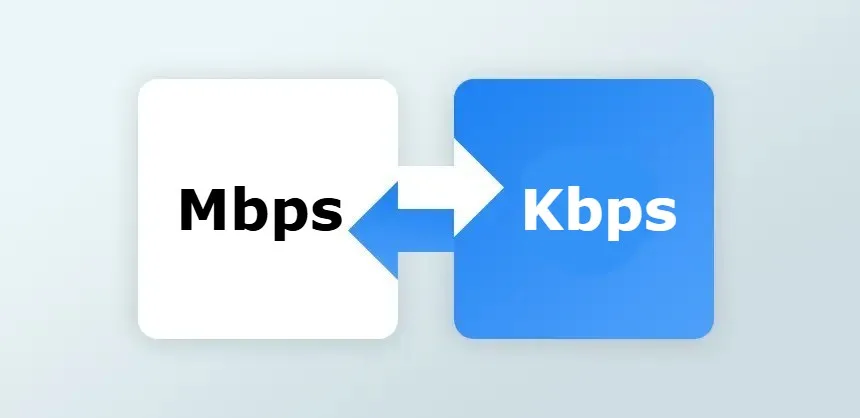Mbps to Kbps Converter - Convert Megabits to Kilobits Online
Convert between Megabits per second (Mbps) and Kilobits per second (Kbps). Analyze bandwidth capabilities, application performance, and real-world network performance.
Enter your Mbps value
Conversion Results
Enter Mbps value to calculate conversion and bandwidth analysis
Related & Other Popular Converters
Convert Mbps to Kbps instantly using our accurate and easy-to-use MBPS to Kbps converter. Whether you are checking your internet speeds, troubleshooting a network, or comparing a variety of data speeds, this tool will do the conversion for you in seconds.

What is Mbps to Kbps Conversion?
The Mbps to Kbps conversion is used to convert Megabits per second (Mbps) into Kilobits per second (Kbps). Both are standard units of data transfer speed.
To illustrate, if your internet speed is 10 Mbps, this would equal 10,000 Kbps according to the decimal standard.
Then use this converter Mbps to Kbps to easily calculate your bandwidth, and gain valuable insight into the speed at which your connection is moving.
How to use the Mbps to Kbps Converter
Our MBPS to Kbps Converter also offers an example in real time as well so that you have a clearer understanding of data speeds, by comparing your results to a 3G, 4G, 5G or Wi-Fi speed.
Formula to Convert Mbps to Kbps
The formula for Mbps to Kbps conversion is simple:
Kbps = Mbps x 1,000 (Decimal)
Kbps = Mbps x 1,024 (Binary)
Example:
10 Mbps x 1,000 = 10,000 Kbps (Decimal)
10 Mbps x 1,024 = 10,240 Kbps (Binary)
You can use this Mbps kbps formula manually or rely on our automated tool for accuracy.
Why use Our Mbps to Kbps Converter?
Our converter Mbps to Kbps ensures precision for both home users and professionals analyzing internet speed or network bandwidth.
Mbps to Kbps Conversion Table
| Mbps | Kbps (Decimal) | Kbps (Binary) |
|---|---|---|
| 1 Mbps | 1,000 Kbps | 1,024 Kbps |
| 5 Mbps | 5,000 Kbps | 5,120 Kbps |
| 10 Mbps | 10,000 Kbps | 10,240 Kbps |
| 50 Mbps | 50,000 Kbps | 51,200 Kbps |
| 100 Mbps | 100,000 Kbps | 102,400 Kbps |
This Mbps kbps table helps you quickly find equivalent values for common speed ranges.
Real World Example
If your Wi-Fi speed test shows 20 Mbps, then:
The speed of your internet connection is 20,000 Kbps, which indicates how quickly data is sent or downloaded every second.
Our Mbps to Kbps Converter is a great tool for almost instant, and accurate conversions. If you're checking the available bandwidth in your network, or checking the download speed of a product the Mbps to kbps converter guarantees every result to be accurate, fast, and reliable.
Start converting Mbps and Kbps now and see for yourself just how easy it is to understand your Mbps to kbps values with SantPro Tools!
FAQs
In the decimal standard, 1 Mbps = 1,000 Kbps. In the binary standard, used in computing, 1 Mbps = 1,024 Kbps.
It makes it easier to compare not only internet speeds in different devices, but also different routers or ISPs to understand your actual data rate to stream or download.
Mbps is faster. One Mbps equals 1,000 Kbps; therefore, 1 Mbps offers higher bandwidth and transfer rates than 1 Kbps.
Use the simple formula: Kbps = Mbps x 1,000 (for decimal) or Kbps = Mbps x 1,024 (for binary).
Yes, according to the decimal standard. 10 Mbps x 1,000 = 10,000 Kbps.
Mbps is a measure of data transfer speed (Megabits per second) while MBps (Megabytes per second) is a measure of data volume. Since 1 Byte = 8 Bits, divide Mbps by 8 to get MBps.